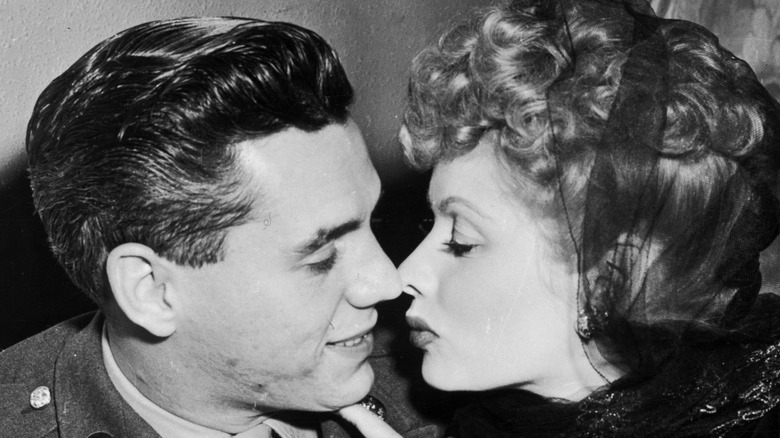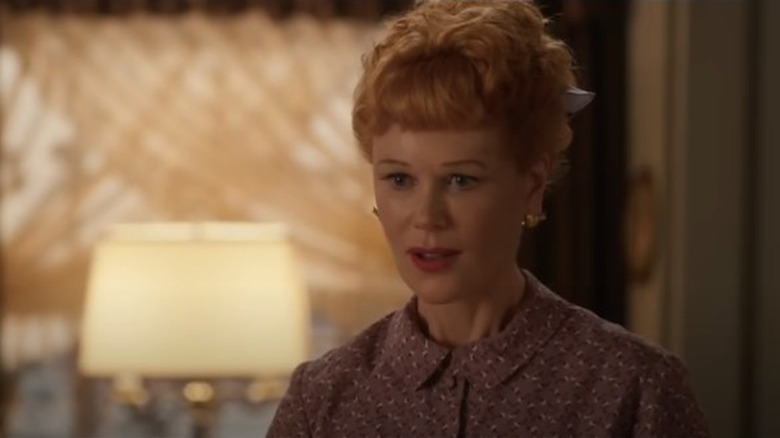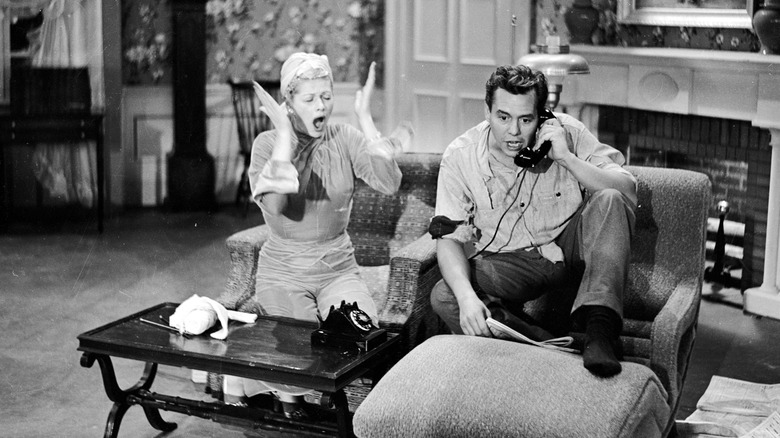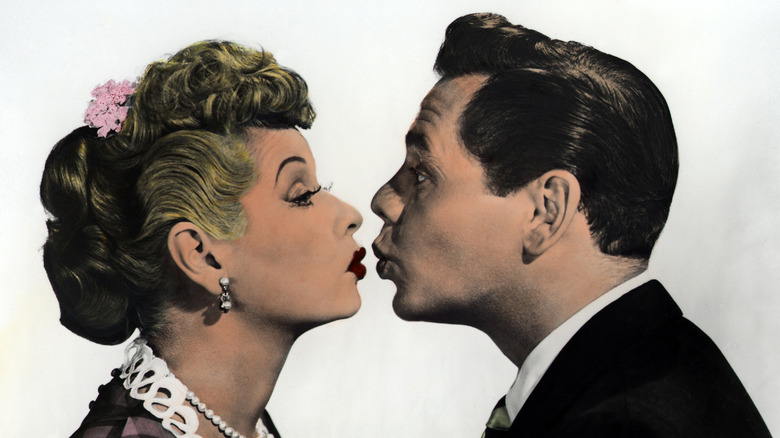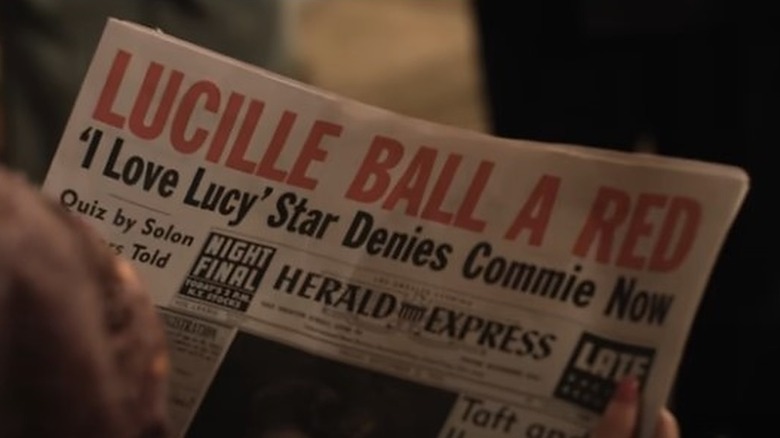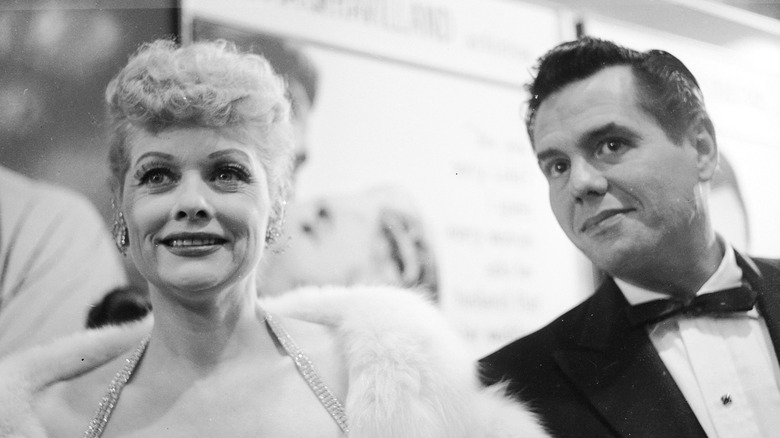How Being The Ricardos Ignored Lucille Ball's True Story
Movies about a real person usually take certain liberties in order to tell a more compelling story. While nobody doubts Lucille Ball's really life was interesting in its own right, fitting a number of those interesting events into a two-hour film still requires some "shuffling around."
The much anticipated new movie "Being the Ricardos," starring Nicole Kidman as Lucille Ball and Javier Bardem as Desi Arnaz, gets a lot of things right: Lucille and Desi's tumultuous relationship, their fight to keep the show going, the trouble with the FBI.
But in order to make it all make sense and capture the essence of what the Ricardos were really like, a few things, including the timeline of those events, have been altered. After all, that's the beauty of the movies, isn't it? We get three of the biggest events that shaped Lucille's life: her second pregnancy, an accusation of being a communist, and a look into Desi's cheating ways. But we don't necessarily get all the details as they truly were in any of those events. "Being the Ricardos" ignored, changed or embellished Lucille Ball's true story.
Ball wasn't actually surprised about the tabloid story
In "Being the Ricardos," we see Lucy read a story in the tabloid magazine Confidential about Desi cheating on her. In a conversation with the actress who plays Ethel soon after, she says Desi has told her, "Lucille, I have been with no girls since the moment I saw you," and she believes him. There's nothing ever said about her knowing about affairs or his cheating.
But the truth is that Ball had been very aware of Desi cheating on her for years. One of the reasons she had pushed so hard to have Desi as her TV husband on "I Love Lucy" is because she figured he wouldn't cheat if he had to be there instead of touring all over the country with his band (per Distractify).
He, of course, found other ways to cheat. According to the Confidential story, Desi wasn't a stranger to calling escort services and having encounters with sex workers. "He has, in fact, sprinkled his affections all over Los Angeles for a number of years," the story reads. "And quite a bit of it has been bestowed on vice dollies who were paid handsomely for loving Desi briefly."
The rumors also included dalliances with famous stars, including Ginger Rogers. Desi wasn't even very discreet about it most of the time. In the book Lucille Ball and Desi Arnaz: They Weren't Lucy and Ricky Ricardo, he's quoted as saying, "Marriage is okay, but adultery is more fun" (as reported via Daily Mail).
Ball wasn't obsessed with hiding her age
During a scene in "Being the Ricardos," Ball is told by the vice-president of RKO Pictures production company (where she had worked on several movies) that they know she's been lying about her age, pretending to be 35 when she's truly 39. In fact, the movie makes it look like she does this all the time, pretending she's younger.
The truth is a bit more simple than that. For starters, the meeting we see in the movie did take place in real life, but it was in 1942, not the year 1951 covered in the movie, so she was actually 31 (not 39) at the time (per YourTango and Elle).
Also, although lying about age in Hollywood was as common then as it is now, Ball didn't actually hide her age. In fact, at the beginning of her autobiography, "Love, Lucy," she says, "I was born on a Sunday, August 6, 1911. Unfortunately, everybody knows my birth date because I told the truth when I first came to Hollywood."
There was one instance where Lucille Ball did lie about her age: when she married Desi Arnaz. Ball was 29 when she married 23-year-old Arnaz, and older women marrying younger men was more than frowned upon at the time. So she took three years off her age and added two years to Arnaz' age.
Ball's private life was often extremely difficult
"Being the Ricardos" shows us the couple struggling through the infidelity accusations and plenty of tension because of outside sources. But we also get the impression there's still a lot of passion — and yes, even sweetness sometimes — between Lucille and Desi.
But the truth is that the couple was going through a pretty rough patch in the 1950s, and things would only get worse. They wouldn't divorce until 1960, but the decade prior to that was filled with a lot of drinking (Arnaz has issues with alcoholism for a long time) and a lot of fighting. During a recent interview, daughter Lucie Arnaz revealed that her parents would fight "all the time." "We didn't have any abuse, but we did go through some pretty hard stuff and that's why my parents didn't stay together," as she told Closer Magazine in 2018.
And while Arnaz was a good businessman, Ball was often the one that kept everything — the marriage and the show — going. After a screening of the movie at Bruin Theater in Westwood, Nicole Kidman commented on Ball's strength, explaining, "She would get up, brush herself off, with Desi's help, and she would just move forward and tackle things" (as quoted via The Hollywood Reporter). While "Being the Ricardos" does a good job off showing us a peek into who Ball was, it barely gets a chance to scratch the surface.
Ball did have some ties with communism
In "Being the Ricardos," Lucille is accused of being a communist through a report by radio personality and gossip columnist Walter Winchell. As with everything else in the movie, this happens in 1951, though the real-life report came out in September 1953 (via The Wrap).
Ball was, technically speaking, part of the Communist Party, as she had registered as such to vote in 1936, but she maintained she had done it for her grandfather. As reported via The Wrap, Ball's explanation for this was simple: His grandfather "had a friend running for city council on the Communist ticket and he insisted that [my mother] DeDe, [my brother] Freddy and I registered so we could vote for him. We did it to please daddy. He'd had one stroke already, and the least little argument got him all upset."
She soon testified in front of the House on Un-American Activities Committee and was cleared of all charges, despite a witness reporting she had attended a "new member communist class" at Ball's residence a year after she had registered to vote (per Esquire). In "Being the Ricardos," however, this detail isn't mentioned.
Lucille was a complicated woman
"Being the Ricardos" portrays Lucille Ball as tough, focused, and all business. We know she's stressed about her husband's potential infidelities. But overall, she comes across as level-headed and strong.
But the real Lucille Ball was a lot more complex than that. According to author and playwright Lee Tannen, who was friends with Ball for many years, she "was very complicated, she was very loving and she was very mercurial. She was a conundrum. She was a paradox of things" (via The Guardian). To be fair, it's hard to convey a lifetime of emotions in a two-hour movie, but the Lucille we see in the movie is definitely not as complex as the real-life woman.
Another thing we don't hear anything about in the movie is Lucille's alleged affairs. In "Being the Ricardos," she's the victim of her husband's escapades, though in real life she was linked to a long list of lovers as well, mostly during the times that Arnaz would be on the road with his band. According to Express, she had affairs with stars like Orson Welles, Robert Mitchum and George Sanders, as well as a decades-long, on-off relationship with Henry Fonda, who would once call her "the love of my life."
